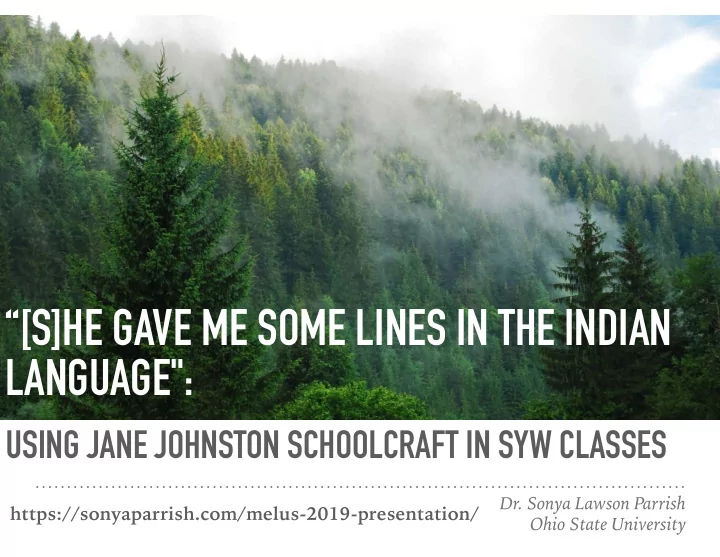

“[S]HE GAVE ME SOME LINES IN THE INDIAN LANGUAGE": USING JANE JOHNSTON SCHOOLCRAFT IN SYW CLASSES Dr. Sonya Lawson Parrish https://sonyaparrish.com/melus-2019-presentation/ Ohio State University
DECOLONIZING YOUR SYLLABUS ➤ Dr. Yvette DeChavez ➤ “The fact is, if academia continues to uphold white men as the pinnacle of literature, they’re also continuing to uphold white supremacy.” ➤ “What I hope to see with the decolonization of syllabi is a reframing of the American narrative and a return to modes of thinking and knowledge that colonization tried so hard to destroy.”
AMERICAN INDIAN RHETORICS IN SECOND YEAR WRITING ➤ “Socioacupuncture pedagogy engages multiple modes and epistemologies, focusing primarily on indigenous ones that are more concerned with literate activity as a holistic and a concretely purposeful community endeavor, a tool for beneficial change” (37). - Sundy Watanabe, “Socioacupuncture Pedagogy: Troubling Containment and Erasure in Multimodal Composition Classrooms” ➤ “Code-switching and translation are means of exercising rhetorical sovereignty and acts of survivance … to resist an imposition of being absent and invisible in the colonial imaginary and to survive the ongoing colonial attempts to define, quiet, and ignore American Indian peoples” (172). - Jessica Safran Hoover, “Rhetorical Sovereignty in Written Poetry: Survivance through Code-Switching and Translation in Laura Tohe’s Tséyí/Deep in the Rock - Reflections on Canyon de Chelly "
ENGLISH SECOND YEAR WRITING AT OHIO STATE UNIVERSITY ➤ 2367.01 - Language, Identity, and Culture in the U.S. Experience ➤ 2367.02 - Literature in the U.S. Experience ➤ GE Requirements - Second-Level Writing and Social Diversity in the U.S. (.02 also fulfills Literature GE) ➤ Learning Outcomes: Clear rhetorical knowledge, critical thinking/reading/writing, knowledge of the composing process, collaboration, composing in electronic environments, and knowledge of conventions of academic writing
MY SPECIFIC COURSES ➤ 2367.01 - Past/Present Tense: Representations of U.S. History as Fact, Fiction, and Context ➤ 2367.02 - “I’m Nobody! Who are you? Are you - Nobody - too?”: Intersectional Identity and American Literature ➤ MWF sections, 55 minutes, 24 students per class ➤ 3 days in each to explore the development of claim-evidence- warrant structures ➤ Used PDF copies of very brief excerpts of Robert Dale Parker’s edited collection The Sound the Stars Make Rushing Through the Sky: The Writings of Jane Johnston Schoolcraft (2008) for both classes
DAY 1 - INTRO TO JANE JOHNSTON SCHOOLCRAFT AND LANGUAGE ISSUES ➤ Reading: JJS poems “To the Pine Tree on first seeing it on returning from Europe” and “On leaving my children John and Jane at School, in the Atlantic states, and preparing to return to the interior” with instructions to read all versions of both (English and Ojibwae) along with all editorial notes ➤ Brief intro to Schoolcraft and Métis culture in early 19th century United States ➤ Think-Pair-Share Activity 1. Initial thoughts on reading both versions, reactions to reading in a language that is unfamiliar/unknown, di ff erences between the two in what you do know (structure, length, editorial notes discussion) 2. Discuss answers with a partner 3. Share common pair ideas about each (“Pine” then “Leaving”) with the class, then discuss di ff erent perspectives found in pairs
DAY 2 - INTRO CLAIM-EVIDENCE-WARRANT STRUCTURES ➤ Readings: Instructor created C-E-W overview PDF and book review “Bicultural Before There Was a Word for It” by Margaret Noori ➤ Claim, evidence, and warrants review and in-depth discussion ➤ On their own, find places where they see Noori making a claim about Parker’s text, list a few claims on the board, then go through how evidence is used and warrants (both explicit and implicit) are present
DAY 3: LANGUAGE, DICTIONARIES, AND C-E-W STRUCTURES ➤ Reading: JJS“The Origin of the Robin” ➤ Intro to the creation of English language dictionaries and Daniel Webster’s American English dictionary ➤ Watch documentary short Marie’s Dictionary in class - ask them to take notes ➤ Briefly discuss plot, purpose, and editorial notes in “The Origin of the Robin” and how it relates to the work Wilcox is currently doing ➤ Pass the Claim Activity 1. Get into groups of three. Designate one person to create a claim that involves language, translation, stories, histories, and/or dictionaries. Pass your claim to your left. 2. Take the claim you are given and list concrete evidence that could support that claim from Marie’s Dictionary or “The Origin of the Robin”/editorial notes. Pass it to person to your left. 3. Review claim-evidence and list explicit and implied warrants for the potential evidence. 4. As a group, discuss your choices, what works best within the lists you have, and possible additions that could strengthen or improve the c-e-w structure.
➤ Varied rhetorics and argument WHY? structures provide a more well-rounded understanding of how arguments can function ➤ Practice is central to good writing ➤ Complicating common assumptions is an important tool in the writer’s tool kit ➤ Upending stories told about America complicates what it is to be and speak like an American ➤ We have a responsibility to our students, the academy, and indigenous communities to show the depth, breadth, and continuation of their culture ➤ “I have a duty to push against whiteness as default and whiteness as dominant, even when that means existing as a paradox.” Yvette DeChavez
WORKS CITED ➤ DeChavez, Yvette. “It’s Time to Decolonize That Syllabus.” Los Angeles Times , 08 October 2018. www.latimes.com/books/la-et-jc-decolonize- syllabus-20181008-story.html. ➤ Hoover, Jessica Safran. “Rhetorical Sovereignty in Written Poetry: Survivance through Code- Switching and Translation in Laura Tohe’s Tséyí/ Deep in the Rock - Reflections on Canyon de Chelly. ” Survivance, Sovereignty, and Story: Teaching American Indian Rhetorics, Lisa King, Rose Gubele, and Joyce Rain King, eds, Utah State UP , 2015. ➤ Parker, Robert Dale. The Sound the Stars Make Rushing Through the Sky: The Writings of Jane Johnston Schoolcraft . U Penn Press, 2008. ➤ Watanabe, Sundy. “Socioacupuncture Pedagogy: Troubling Containment and Erasure in Multimodal Composition Classrooms.” Survivance, Sovereignty, and Story: Teaching American Indian Rhetorics, Lisa King, Rose Gubele, and Joyce Rain King, eds, Utah State UP , 2015.
Recommend
More recommend